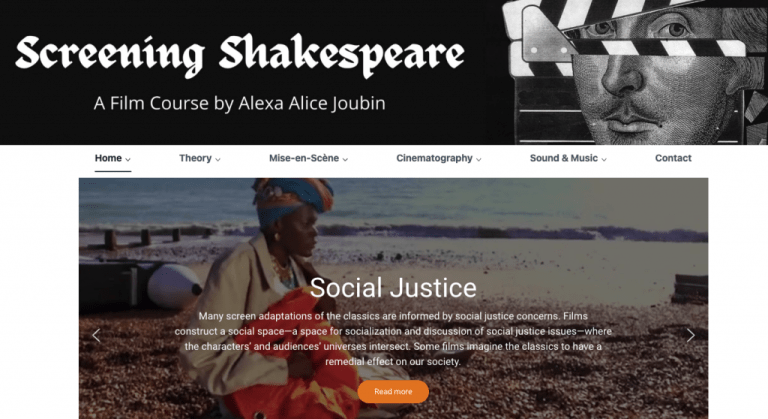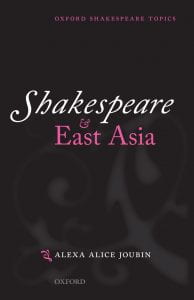 When AI goes to theater with humans, it changes the dynamics of the social space. This article examines a case of audiences using an AI app on their phones to translate a sign language performance. Whom does the screen interface serve, and how do artificial intelligence tools affect theatrical publics across both the playing space and the playgoing space? Screens are a site where cultural and performative meanings are generated and negotiated.
When AI goes to theater with humans, it changes the dynamics of the social space. This article examines a case of audiences using an AI app on their phones to translate a sign language performance. Whom does the screen interface serve, and how do artificial intelligence tools affect theatrical publics across both the playing space and the playgoing space? Screens are a site where cultural and performative meanings are generated and negotiated.
Category: Innovative Adaptations
Open-Access Textbook: Screening Shakespeare
We are pleased to announce the publication of MIT Global Shakespeares co-founder Alexa Alice Joubin’s Screening Shakespeare, a new, open-access, online textbook with interactive learning modules. You can learn about key concepts of film and adaptation studies. The openly-licensed book is free to all. You can learn about film theory, mise-en-scène, cinematography, sound and music, and adaptation strategies in the context of global Shakespeare.
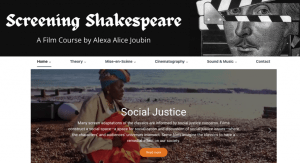
...continue reading "Open-Access Textbook: Screening Shakespeare"
The Value of Global Shakespeare
Shakespeare and East Asia (2021) explores distinctive themes in post-1950s Asian-themed performances and adaptations of Shakespeare. In this Snapshot, former Fulbright Scholar Alexa Alice Joubin discusses the book and the importance of wider research into Global Shakespeares. ...continue reading "The Value of Global Shakespeare"
Soviet Shakespeares
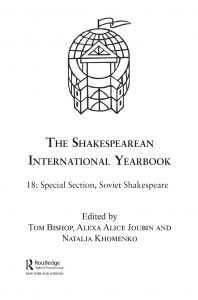
Due to Karl Marx’s frequent references in his political treatises, Shakespeare held a significant place in a number of communist and other left-authoritarian countries, including China and the USSR. And although there were themes in Shakespeare that turned out to be inconvenient for communist ideology, other Shakespearean plays were put into service. In Part I of this volume of the Yearbook, the special section of chapters explores the vicissitudes of artistic and political uses of Shakespeare in Soviet culture and ideology after the October Revolution in 1917, including in some of the continuing resonances of those uses since the collapse of the Soviet Union. And while the real and perceived resistance to prevailing ideologies of Soviet directors has tended to capture recent critical attention, there is a wide range of Soviet and post-Soviet interpretations of Shakespeare. ...continue reading "Soviet Shakespeares"
How Shakespeare Cures a Stuttering King
 The King's Speech (dir. Tom Hooper, 2010) and The Theory of Everything (dir. James Marsh, 2015) deal with figures that suffer from speech impairment. Lines from Shakespeare play an important role in scenes about speech therapy in The King's Speech.
The King's Speech (dir. Tom Hooper, 2010) and The Theory of Everything (dir. James Marsh, 2015) deal with figures that suffer from speech impairment. Lines from Shakespeare play an important role in scenes about speech therapy in The King's Speech.
Having worked with multiple therapists without any result, Bertie (Prince Albert, Duke of York, later King George VI), a stutterer, is reluctant to receive treatment from Lionel Logue. In their first session, Logue bets Bertie a shilling that he can in fact read without stammer right away, and he would record his speech as evidence. Logue puts headphones on Bertie and asks him to read Hamlet’s “to be or not to be” speech into a Silvertone Home Voice Recorder. ...continue reading "How Shakespeare Cures a Stuttering King"
Ethics of Performative Citations of Shakespeare
 Global Shakespeare can be studied through two interrelated concepts: performance as an act of citation and the ethics of citation. Appropriating the classics carries strong ethical implications. A crucial, ethical component of appropriation is one’s willingness to listen to and be subjected to the demands of others. These metaphorical citations create moments of self and mutual recognition. Seeing the others within is the first step toward seeing oneself in others’ eyes. The act of citation is founded upon the premise of one’s subjectivity, the subject who speaks, and the other’s voice that one is channeling, misrepresenting, or appropriating. ...continue reading "Ethics of Performative Citations of Shakespeare"
Global Shakespeare can be studied through two interrelated concepts: performance as an act of citation and the ethics of citation. Appropriating the classics carries strong ethical implications. A crucial, ethical component of appropriation is one’s willingness to listen to and be subjected to the demands of others. These metaphorical citations create moments of self and mutual recognition. Seeing the others within is the first step toward seeing oneself in others’ eyes. The act of citation is founded upon the premise of one’s subjectivity, the subject who speaks, and the other’s voice that one is channeling, misrepresenting, or appropriating. ...continue reading "Ethics of Performative Citations of Shakespeare"
Ophelia Unbound
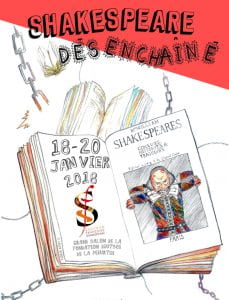
How does Ophelia become “unbound” through supralinguistic structures of spectacle and music especially in a transgender performance? With case studies of three Hamlet films: Haider (India, 2004), The King and the Clown (South Korea, 2005), and Prince of the Himalayas (Tibet, 2006), this article examines theatrical and cinematic presentations of Ophelia's double bind as an icon and a victim. ...continue reading "Ophelia Unbound"
Ethics of Global Shakespeare
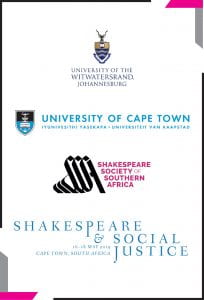
The dialogues between Shakespeare and his modern interlocutors are driven by ethical claims and the use of Shakespeare for political expediency. While artists and critics alike gravitate toward inspirational narratives, there is the risk of selling out on art’s impact on social justice. Advertising trends—or cultural paratexts around performances—are one area where artists’ ethical claims are sometimes countered by marketing shortcuts especially in relation to presentations of racial and gender diversity. In some cases, what appear to be multiethnic performances based on the casts turn out to be aesthetically incoherent, while in other cases queerness is framed as a defining feature when a production does not actively engage with gender diversity.
Here are highlights of my paper delivered at the Shakespeare Society of South Africa conference on "Shakespeare and Social Justice" in Fugard Theatre, Cape Town, May 16-18, 2019. ...continue reading "Ethics of Global Shakespeare"
Local and Global Myths in Shakespearean Performance
Local and Global Myths in Shakespearean Performance
Edited by Aneta Mancewicz and Alexa Alice Joubin
In the Reproducing Shakespeare series (ed. Tom Cartelli and Katherine Rowe)
Palgrave Macmillan, 2018
“Contradictory myths are the foundation to many conversations about Shakespeare today. We can better grasp the significance of globalShakespeare by understanding the cultural logic of the production and consumption of these myths—often articulated in the form of journalistic adoration of universal aesthetics.”
Full text of the Introduction: researchgate.net/profile/Alexa_Joubin
...continue reading "Local and Global Myths in Shakespearean Performance"
“To unpath’d waters, undream’d shores”: Shakespeare in the World
"Voodoo" Macbeth? Heir apparent of the Denmark Corporation in Manhattan (Hamlet 2000)? A pair of star-crossed lovers from feuding families who own competing food stalls in Singapore (Chicken Rice War). In the centuries since William Shakespeare's death, numerous stage and, more recently, film and television adaptations of his work have emerged to inspire, comfort, and provoke audiences in far-flung corners of the globe. As early as 1619, for example, Hamlet was performed in colonial Indonesia to entertain European expatriates. In 1845, U.S. Army officers staged Othello in Corpus Christi, Texas, as a distraction from the run-up to the Mexican-American War. Supported by the National Endowment for the Arts, the Alabama Shakespeare Festival toured its production of Macbeth to several key U.S. military bases in 2004. ...continue reading "“To unpath’d waters, undream’d shores”: Shakespeare in the World"

